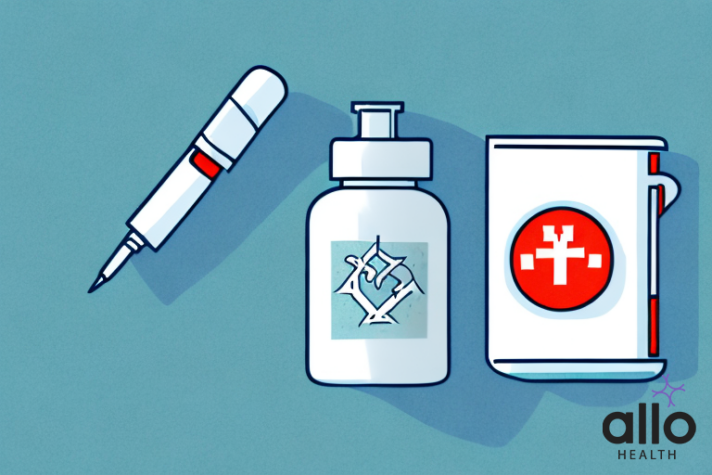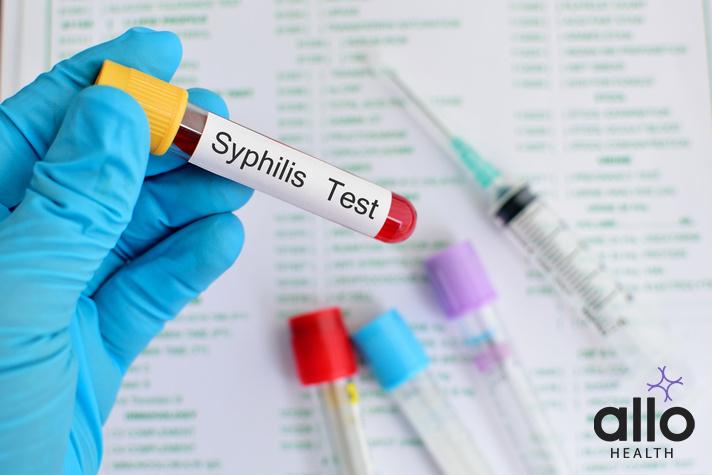Using Levofloxacin to Treat Syphilis: An Overview

Allo Health is dedicated to personalized well-being, offering support and trusted information tailored to individual health goals. The platform emphasizes human-generated content, led by a distinguished medical team of experts, including physicians and sexual health specialists. Their commitment to credibility involves rigorous fact-checking, authoritative research, and continuous updates to ensure accurate, up-to-date information. Allo Health's unique approach goes beyond conventional platforms, providing expert-led insights and a continuous commitment to excellence, with user feedback playing a crucial role in shaping the platform's authoritative voice.

Dr Sanina Mansoor holds MBBS degree from Yenepoya university,Mangalore.She has 8 years of experience working as a medical officer at various health centres and medical colleges.
Why This Was Upated?
Our experts continually monitor the health and wellness space, and we update our articles when new information became available.
Updated on 14 March, 2024
- Article was updated as part of our commitment to diversity, equity, and inclusion.

"The following blog article provides information about a drug or brand name drug and its potential effects or benefits. However, it is crucial to understand that this information is intended for general educational purposes only and should not be considered a substitute for professional medical consultation. It is highly recommended to consult with a qualified healthcare professional before making any decisions regarding medication, treatment, or healthcare management.
Book consultation
Individuals have unique medical conditions, and the information provided in this article may not be applicable to everyone. Only a qualified healthcare provider can evaluate your specific medical situation, taking into account your medical history, conducting appropriate tests, and providing personalized advice and recommendations. They are equipped to make informed decisions tailored to your individual needs.
It is crucial to emphasize that self-diagnosis, self-medication, or disregarding medical advice can have serious health consequences. This article may reference specific brand names or drugs for illustrative purposes. Mention of these names does not imply endorsement, recommendation, or guarantee of their efficacy or safety. The choice of medication should be based on discussions and individualized guidance from a healthcare professional who has a comprehensive understanding of your medical condition.
"Syphilis is a sexually transmitted infection caused by the bacterium Treponema pallidum. It is a serious disease that can cause a range of complications if left untreated, including blindness, dementia, and even death. Fortunately, syphilis is easily treatable with antibiotics, and one such antibiotic is levofloxacin. This article will provide an overview of how levofloxacin can be used to treat syphilis.
Syphilis Overview
Syphilis is a sexually transmitted infection (STI) caused by the bacterium Treponema pallidum. It can also be transmitted from an infected mother to her unborn child during pregnancy. Syphilis has been a significant public health concern throughout history, and although its prevalence has decreased in recent decades, it remains a global health concern.
Here is an overview of syphilis, covering various aspects of the infection:
- Transmission:
- Syphilis is primarily transmitted through direct contact with syphilis sores (lesions or chancres) during sexual activity.
- It can also be transmitted from an infected mother to her baby during childbirth (congenital syphilis).
- Rarely, syphilis can be transmitted through blood transfusions or organ transplantation.
- Stages of Syphilis: Syphilis progresses through four distinct stages, each with its own set of symptoms:
- Primary Syphilis: The first stage is characterized by the development of painless sores or ulcers (chancres) at the site of infection, usually genitals, anus, or mouth. These sores can heal on their own, but the infection persists if left untreated.
- Secondary Syphilis: If untreated, the infection progresses to the secondary stage, marked by skin rashes, mucous membrane lesions, and flu-like symptoms. Secondary syphilis can occur weeks to months after the initial infection.
- Latent Syphilis: In this stage, the symptoms disappear, but the bacteria remain in the body. Latent syphilis can be early (less than one year) or late (more than one year). Some individuals progress to the tertiary stage, while others remain in the latent stage for life.
- Tertiary Syphilis: This stage can occur years later and can lead to severe complications such as damage to the heart, brain, nerves, and other organs. Tertiary syphilis is rare but can be life-threatening.
- Diagnosis: Diagnosis involves a combination of clinical evaluation, blood tests, and, if applicable, examination of lesions or fluids from sores.
- Treatment: Syphilis is curable with appropriate antibiotics, usually penicillin. The choice of antibiotic and duration of treatment depend on the stage and severity of the infection.
- Prevention:
- The most effective way to prevent syphilis is through safe sexual practices, including the use of condoms.
- Regular screening for syphilis is important, especially for individuals with multiple sexual partners or those at higher risk.
- Congenital Syphilis: Pregnant women should undergo syphilis screening to prevent transmission to the fetus. If detected early, syphilis in pregnancy can be treated to prevent congenital syphilis.
- Public Health Impact: Syphilis remains a concern for public health due to its potential complications and the risk of transmission. Periodic increases in syphilis cases have been observed in various regions.
It’s crucial for individuals at risk of syphilis to practice safe sex, undergo regular STI screenings, and seek prompt medical attention if they experience symptoms. Early detection and treatment are essential to prevent complications and reduce the spread of the infection.

Syphilis Treatments
Syphilis is a bacterial infection caused by Treponema pallidum, and it can be effectively treated with antibiotics. The choice of antibiotic and the duration of treatment depend on the stage of the infection. Penicillin is the preferred and most commonly used antibiotic for treating syphilis. Here are the details of syphilis treatments:
- Primary and Secondary Syphilis: For primary and secondary syphilis, a single intramuscular injection of benzathine penicillin G is the recommended treatment. The dosage may vary depending on the severity and duration of infection.
- Latent Syphilis:
- Early latent syphilis (less than one year duration) can be treated with a single intramuscular injection of benzathine penicillin G.
- Late latent syphilis (more than one year duration) or latent syphilis of unknown duration may require three weekly doses of benzathine penicillin G.
- Tertiary Syphilis: Tertiary syphilis, which involves severe complications like cardiovascular or neurosyphilis, may require more intensive treatment. In such cases, intravenous penicillin G may be administered.
- Alternative Antibiotics: For individuals who are allergic to penicillin, alternative antibiotics such as doxycycline or tetracycline may be prescribed. But these are generally not recommended for pregnant women or for treating neurosyphilis.
- Pregnant Women: Pregnant women with syphilis should be treated with penicillin, as it is the most effective and safe option for both the mother and the fetus. The dosage and duration depend on the stage of syphilis and the likelihood of transmission to the fetus.
- Follow-up Testing: After treatment, individuals with syphilis should undergo follow-up testing to ensure that the infection has been adequately treated. This is crucial for monitoring treatment success and identifying any potential reinfections.
- Partner Notification and Testing: Sexual partners of individuals diagnosed with syphilis should also be notified, tested, and treated if necessary to prevent further transmission.
- Prevention of Reinfection: Individuals treated for syphilis should abstain from sexual activity until the sores are fully healed and follow-up tests confirm that the infection has been successfully treated. Using condoms consistently and correctly can also help prevent reinfection.
Self-medication or incomplete treatment can lead to persistent infection and potential complications. Therefore, individuals diagnosed with syphilis should follow their healthcare provider’s recommendations closely and complete the prescribed course of antibiotics. Early detection and treatment are essential not only for the individual’s health but also for preventing the spread of syphilis to others.
Levofloxacin Overview
Levofloxacin is a fluoroquinolone antibiotic used to treat a variety of bacterial infections. It belongs to a class of antibiotics that work by inhibiting the DNA gyrase enzyme, preventing DNA replication and bacterial cell division. Here is a detailed overview of levofloxacin:
- Mechanism of Action: Levofloxacin works by inhibiting DNA gyrase, an essential enzyme for bacterial DNA replication. This mechanism disrupts bacterial cell division, leading to the death of the bacteria.
- Indications and Uses: Levofloxacin is prescribed to treat various bacterial infections, including respiratory tract infections, urinary tract infections, skin and soft tissue infections, and certain types of pneumonia. It is also used in the treatment of chronic bacterial prostatitis and certain sexually transmitted infections.
- Spectrum of Activity: Levofloxacin has a broad spectrum of activity against both Gram-positive and Gram-negative bacteria. It is effective against many respiratory and urinary pathogens, including strains resistant to other antibiotics.
- Administration and Dosage: Levofloxacin is usually administered orally, but intravenous formulations are also available. The dosage depends on the type and severity of the infection, as well as individual factors such as age and renal function.
- Pharmacokinetics: The drug is well-absorbed after oral administration, reaching peak plasma concentrations within 1-2 hours. It has a relatively long half-life, allowing for once-daily dosing in many cases. Levofloxacin is eliminated primarily through the kidneys.
- Adverse Effects: Common side effects include nausea, diarrhea, headache, and dizziness. More serious but rare adverse effects may include tendonitis, tendon rupture, and central nervous system effects. Levofloxacin is generally not recommended for use in children, pregnant women, or breastfeeding mothers.
- Resistance and Precautions: Increasing bacterial resistance to levofloxacin has been observed. It is crucial to use the antibiotic judiciously to prevent the development of resistance. Levofloxacin should not be used for viral infections, such as the common cold or flu.
- Drug Interactions: Levofloxacin can interact with various medications, including antacids, iron supplements, and certain anticoagulants. It’s important to inform healthcare providers about all medications being taken to avoid potential interactions.
- Special Populations: Caution is advised when prescribing levofloxacin to elderly patients and those with pre-existing conditions, such as renal impairment. Dosage adjustments may be necessary based on individual health factors.
- Monitoring and Follow-up: Patients taking levofloxacin should be monitored for any signs of adverse effects, and healthcare providers may order periodic laboratory tests, especially for those with pre-existing conditions.
Levofloxacin is a valuable tool in the antibiotic arsenal, but its use should be guided by a healthcare professional. Appropriate diagnosis, careful consideration of potential risks, and adherence to recommended dosages are essential for maximizing the benefits of levofloxacin while minimizing the risks of adverse effects and bacterial resistance.

Using Levofloxacin to Treat Syphilis: An Overview
Levofloxacin is not considered a first-line treatment for syphilis. The preferred and recommended antibiotic for treating syphilis is penicillin. Syphilis is caused by the bacterium Treponema pallidum, and penicillin has demonstrated high efficacy in eradicating this bacterium.
But, if an individual has a documented allergy to penicillin or if penicillin is unavailable, healthcare providers may consider alternative antibiotics. Levofloxacin is a fluoroquinolone antibiotic and has been used in some cases when penicillin cannot be administered. The use of alternative antibiotics, including levofloxacin, may not be as effective as penicillin and should be approached with caution.
Here is an overview of using levofloxacin to treat syphilis:
- Considerations for Alternative Antibiotics: Levofloxacin may be considered as an alternative treatment for syphilis in cases where penicillin cannot be used, such as in the presence of a severe penicillin allergy.
- Dosage and Duration: The specific dosage and duration of levofloxacin treatment for syphilis can vary, and it should be determined by a healthcare professional based on the individual’s medical history and the stage of syphilis.
- Monitoring and Follow-up: Individuals treated with levofloxacin for syphilis should be closely monitored to ensure the effectiveness of the treatment. Follow-up testing is essential to confirm the clearance of the infection.
- Limitations and Considerations: Levofloxacin is not recommended for pregnant women, as it may pose risks to the developing fetus. Pregnant women with syphilis should receive penicillin-based treatment under the guidance of a healthcare provider.
- Effectiveness Compared to Penicillin: While levofloxacin and other alternative antibiotics may be effective in some cases, they are generally considered less reliable than penicillin for treating syphilis. Penicillin remains the first-line treatment due to its proven efficacy and safety.
- Consultation with a Specialist: The decision to use levofloxacin or any alternative antibiotic for syphilis should be made in consultation with an infectious disease specialist or healthcare provider experienced in managing STIs.
It’s crucial to emphasize that self-medication or the use of alternative antibiotics without proper medical guidance can lead to treatment failure, persistent infection, and potential complications. If an individual is diagnosed with syphilis and has concerns about penicillin allergy or other factors, they should consult with a healthcare professional to determine the most appropriate and effective treatment plan for their specific situation.
Most Asked Questions
-
Can Levofloxacin Be Used as a First-Line Treatment for Syphilis?
No, penicillin is the recommended first-line treatment for syphilis. Levofloxacin is considered an alternative only in cases of penicillin allergy or unavailability.
-
Is Levofloxacin Safe for Pregnant Women with Syphilis?
No, levofloxacin is not recommended for pregnant women with syphilis due to potential risks to the developing fetus. Penicillin is the preferred treatment during pregnancy.
-
What is the Dosage and Duration of Levofloxacin Treatment for Syphilis?
Dosage and duration depend on factors such as the stage of syphilis and individual health. It's crucial to consult with a healthcare professional for personalized guidance.
-
How Effective is Levofloxacin Compared to Penicillin for Syphilis?
While levofloxacin can be effective in certain cases, it is generally considered less reliable than penicillin. Penicillin remains the gold standard for syphilis treatment.
-
Can Levofloxacin Be Used for Syphilis Prevention in High-Risk Individuals?
No, levofloxacin is not recommended for syphilis prevention. Safe sex practices, regular screening, and prompt treatment with appropriate antibiotics, such as penicillin, are key preventive measures.






































